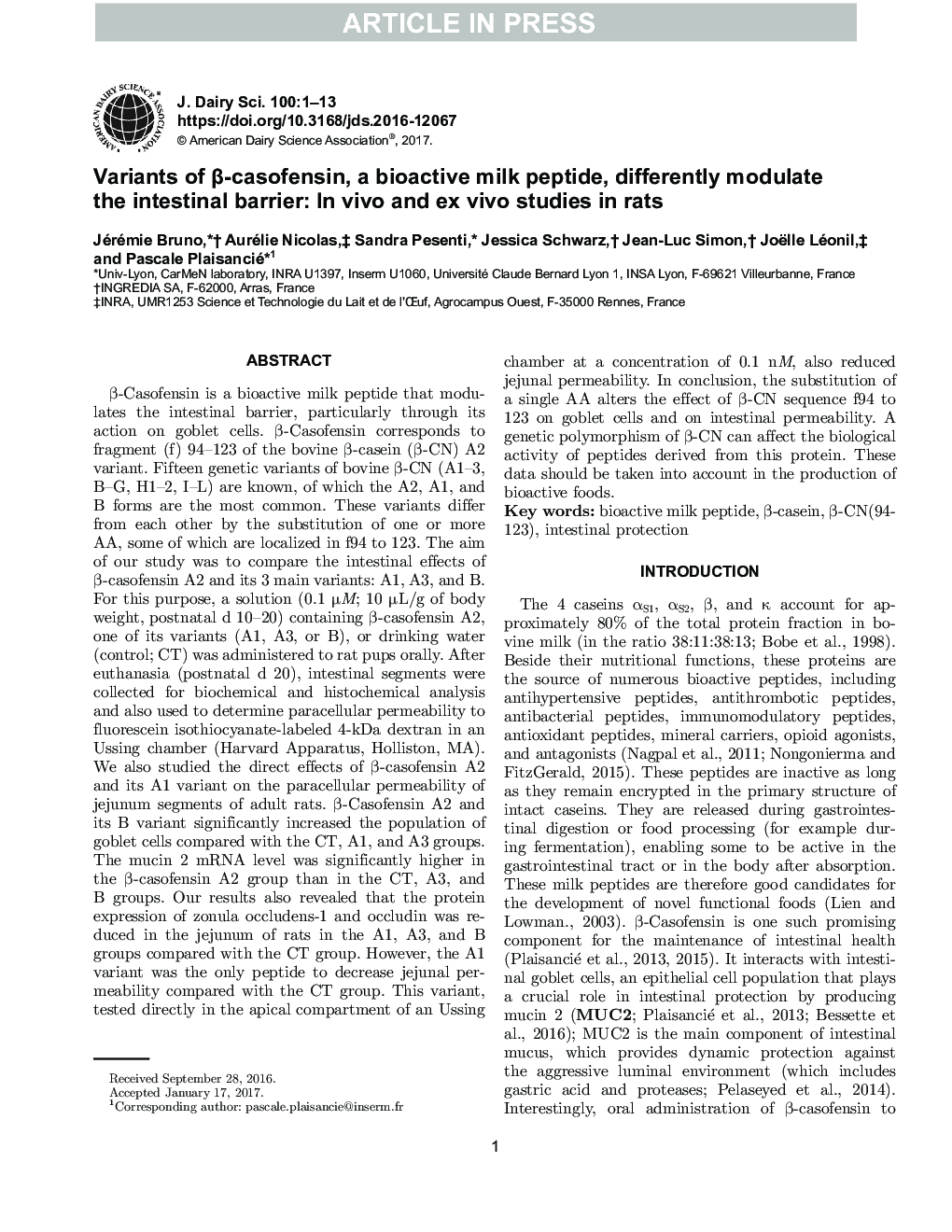| کد مقاله | کد نشریه | سال انتشار | مقاله انگلیسی | نسخه تمام متن |
|---|---|---|---|---|
| 5542137 | 1402515 | 2017 | 13 صفحه PDF | دانلود رایگان |
عنوان انگلیسی مقاله ISI
Variants of β-casofensin, a bioactive milk peptide, differently modulate the intestinal barrier: In vivo and ex vivo studies in rats
دانلود مقاله + سفارش ترجمه
دانلود مقاله ISI انگلیسی
رایگان برای ایرانیان
کلمات کلیدی
موضوعات مرتبط
علوم زیستی و بیوفناوری
علوم کشاورزی و بیولوژیک
علوم دامی و جانورشناسی
پیش نمایش صفحه اول مقاله

چکیده انگلیسی
β-Casofensin is a bioactive milk peptide that modulates the intestinal barrier, particularly through its action on goblet cells. β-Casofensin corresponds to fragment (f) 94-123 of the bovine β-casein (β-CN) A2 variant. Fifteen genetic variants of bovine β-CN (A1-3, B-G, H1-2, I-L) are known, of which the A2, A1, and B forms are the most common. These variants differ from each other by the substitution of one or more amino acids, some of which are localized in f94 to 123. The aim of our study was to compare the intestinal effects of β-casofensin A2 and its 3 main variants: A1, A3, and B. For this purpose, a solution (0.1 µM; 10 μL/g of body weight, postnatal d 10-20) containing β-casofensin A2, one of its variants (A1, A3, or B), or drinking water (control; CT) was administered to rat pups orally. After euthanasia (postnatal d 20), intestinal segments were collected for biochemical and histochemical analysis and also used to determine paracellular permeability to fluorescein isothiocyanate-labeled 4-kDa dextran in an Ussing chamber. We also studied the direct effects of β-casofensin A2 and its A1 variant on the paracellular permeability of jejunum segments of adult rats. β-Casofensin A2 and its B variant significantly increased the population of goblet cells compared with the CT, A1, and A3 groups. The mucin 2 mRNA level was significantly higher in the β-casofensin A2 group than in the CT, A3, and B groups. Our results also revealed that the protein expression of zonula occludens-1 and occludin was reduced in the jejunum of rats in the A1, A3, and B groups compared with the CT group. However, the A1 variant was the only peptide to decrease jejunal permeability compared with the CT group. This variant, tested directly in the apical compartment of an Ussing chamber at a concentration of 0.1 nM, also reduced jejunal permeability. In conclusion, the substitution of a single amino acid alters the effect of β-CN sequence f94 to 123 on goblet cells and on intestinal permeability. A genetic polymorphism of β-CN can affect the biological activity of peptides derived from this protein. These data should be taken into account in the production of bioactive foods.
ناشر
Database: Elsevier - ScienceDirect (ساینس دایرکت)
Journal: Journal of Dairy Science - Volume 100, Issue 5, May 2017, Pages 3360-3372
Journal: Journal of Dairy Science - Volume 100, Issue 5, May 2017, Pages 3360-3372
نویسندگان
Jérémie Bruno, Aurélie Nicolas, Sandra Pesenti, Jessica Schwarz, Jean-Luc Simon, Joëlle Léonil, Pascale Plaisancié,